Video: Dutch Coast Guard Rescues Drifting Cargo Ship in North Sea Storm
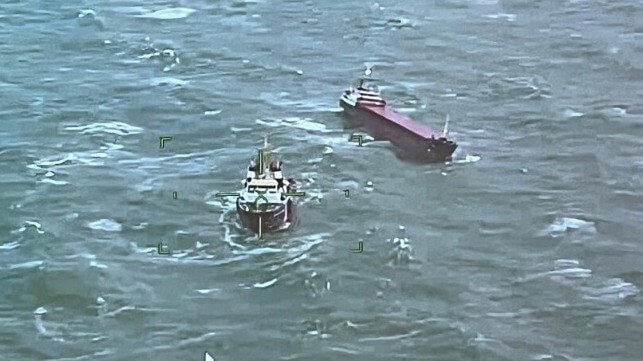
The Dutch Coast Guard reports that shipping is being interrupted in the North Sea by a fierce storm, the fourth storm of the season to have been given a name. They have assisted several vessels including stopping a small cargo ship that was drifting toward the shore near Rotterdam after losing its rudder.
The emergency call was received mid-morning on December 7 from the Valday (2,500 dwt) a short-sea dry cargo vessel registered in Antigua and Barbuda and managed from Latvia. The ship had a crew of seven aboard and was approximately 14 miles off the coast near Rotterdam. The Dutch Coast Guard reports the vessel had no cargo aboard but had lost its rudder and was drifting after losing its anchors.
Weather conditions were making a rescue attempt difficult with waves of 13 feet (4 meters) and winds gusting between 34 and 54 knots. The emergency tug Multraship Commander made several attempts to secure a towline but called off the attempts when one of its crewmembers was injured. A Dutch Coast Guard helicopter airlifted the injured crewmember from the tug to a hospital. This individual was released from the hospital while the Coast Guard reports two other individuals were also slightly injured during the multiple attempts to secure the vessel.
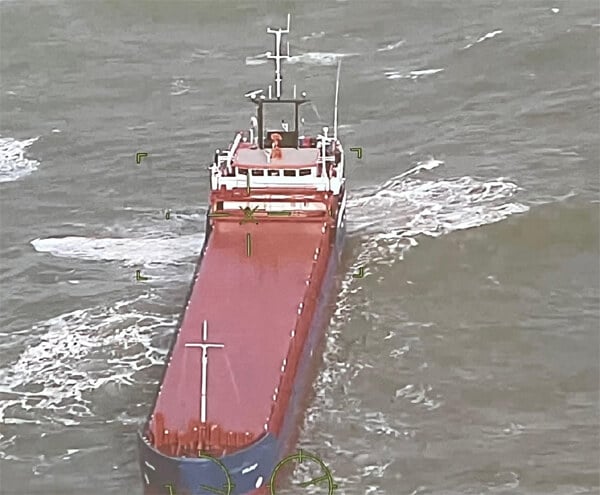
Valday reported it lost its rudder and its anchorage in the storm (Dutch Coast Guard)
The tug Fairplay-33 was called in for a further attempt to secure the 269-foot (82-meter) vessel as it continued to drift in the violent North Sea. This tug also made several efforts but failed to secure a towline.
Weather conditions improved in the afternoon and the Mutraship Commander made new attempts to secure the drifting Valday. The lifeboat Antoinette from the Netherlands also became involved in the efforts.
Shortly after 1500, the Coast Guard reported the effort successful in securing a line to the drifting vessel. The immediate goal was to keep the ship stable and prevent a grounding. By 1600, the Coast Guard reported that the tow was heading to the port of Rotterdam.
They also assisted several other vessels that reported engine problems or difficulties remaining at anchor in the storm. Dutch media is reporting that shipping in the Irish Sea, North Sea, and the English Channel has all been impacted by the storm.
Cargo Ship Grounds in Norway Loaded with Military Supplies for Poland
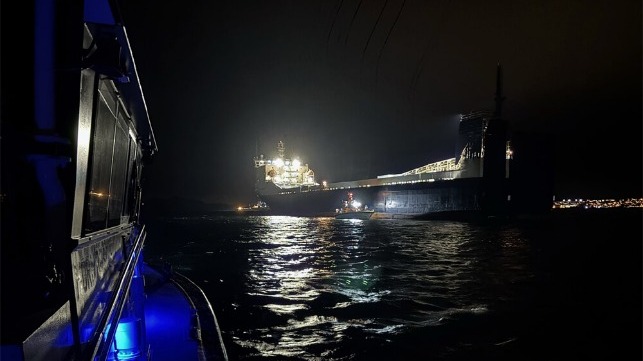
The DFDS Ro-Ro cargo ship Finlandia Seaways (8,700 dwt) grounded last night, December 5, departing Norway. It quickly became apparent it was no ordinary casualty as the Norwegian military established a security zone and confirmed the vessel was loaded with military equipment being sent to Poland for the protection of NATO allies.
Norway’s Defense Force chartered the Danish-registered cargo ship from DFDS and it was seen loading military supplies under tight security near Kristiansund, Norway. The vessel departed on December 4, but late on Thursday, December 5, grounded in the narrow Karmsundet Strait near Haugesund, north of Stavanger in southwest Norway.
Tugs were dispatched to hold the vessel in place due to high winds in the area with some reports indicating there was a small intake of water. The vessel’s rudder and propeller were damaged. There is a crew of 23 aboard but no reports of injuries and the captain reported an evacuation was not required.
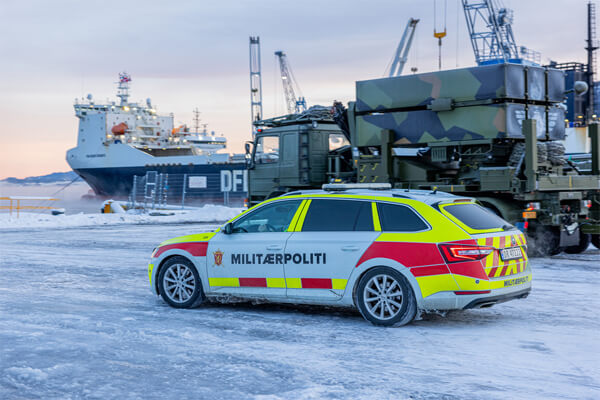
Air defense system being loaded on the vessel in Norway (Ole Andreas Vekve photo courtesy of Forsvaret)
A security zone went up around the vessel with a spokesperson for the Norwegian Defense Force confirming to the media that they were guarding the cargo. The vessel was loaded with a NASAMS air defense system being sent to Poland to be used to protect Rzeszow’s Jasionka airport in the southeast which is operating as a key staging point for NATO and the allies sending weaponry into Ukraine. Norway also confirmed it is sending F-35 jet fighters and around 100 soldiers for training and to protect the airport.
The grounding happened at around 9:30 p.m. local time and when the winds died down the tugs were able to reposition the vessel and dock it in Husoya, Norway. The Finlandia Seaways had been due to arrive in Gdynia, Poland on December 7. The military reports they are looking for a replacement vessel confirming there would be a “slight delay” in getting the equipment to Poland.
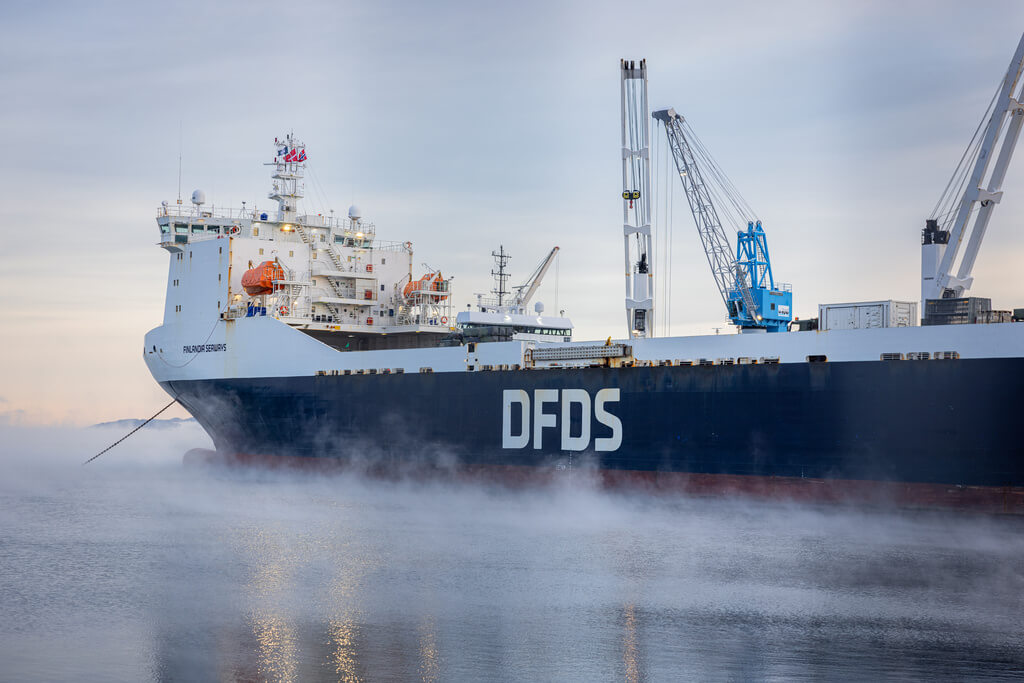
Finlandia Seaways was under charter to the Norwegian Defense Force to delivery the military supplies to Poland (Ole Andreas Vekve photo courtesy of Forsvaret)
The Norwegian Coast Guard and Maritime Safety Authority were also investigating the incident. Media reports said it happened as the pilot was preparing to leave the vessel. Both the pilot and captain were interviewed and tested for alcohol but the media reports they were not detained.
A spokesman for the military told the media there was “nothing dramatic” about the incident.
India and Pakistan Coordinate to Rescue Crew from Sinking Cargo Ship
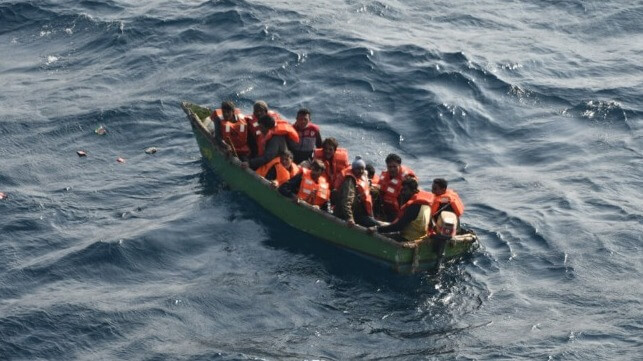
The Coast Guard from India and Pakistan along with the Pakistan Navy coordinated in an effort to save the crew of a small Indian cargo ship sinking in the Arabian Sea. In a demonstration of cooperation and coordination, the forces were able to save 12 crewmembers who abandoned their vessel in rough seas.
India’s maritime coordination and rescue center in Mumbai received the distress call from the cargo ship Al Piranpir on the morning of December 4 located nearly 150 nautical miles west of Dwarka in northwest India. The vessel which was sailing from Iran to India was determined to be in Pakistan’s Search and Rescue Zone.
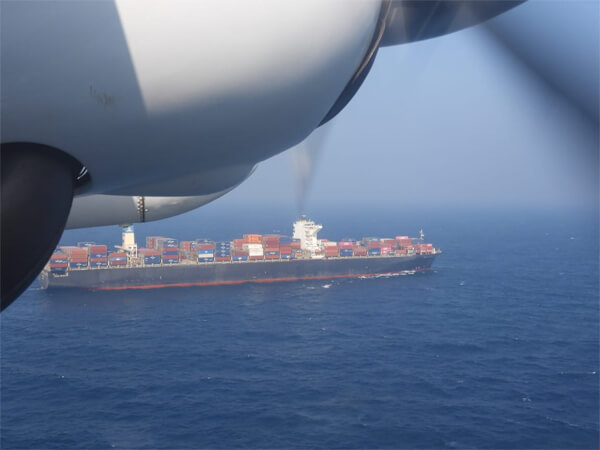
Pakistan dispatched an airplane and a COSCO containership joined the rescue effort (PMSA)
The Indian Coast Guard diverted its vessel, Sarthak, while also contacting their colleagues in Pakistan to request assistance. The Pakistan Maritime Security Agency dispatched an airplane to begin the search while also alerting nearby commercial vessels. The containership COSCO Glory responded to the calls for assistance.
Vessels from the Pakistan Navy and Maritime Security Agency were also involved and when one of the patrol boats reached the area it was determined that the vessel had sunk and that the crew was in a small launch with an outboard motor.
Pakistan successfully coordinated the rescue and the survivors were transferred to the Indian Coast Guard vessel when it reached the area. They were given medical checks and reported to be in good condition. The Indian Coast Guard was transporting them to Porbandar, India.
It was not the first time the vessel had been in distress. The U.S. Navy reported in July 2021 that its guided missile destroyer USS Halsey received an emergency distress call from the disabled Al Piranpir, which had been adrift for 48 hours due to mechanical issues. The USN assisted the crew of the Indian vessel which was able to get back underway under its own power.
ECOCIDE
Ship Abandoned off Yemen Listing and Leaking Oil as Crew Reaches Djibouti
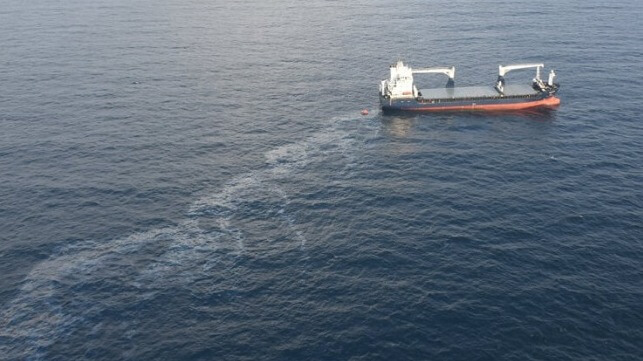
The crew from the Panama-flagged cargo ship ISA Star arrived in Djibouti on Friday, December 6 after having left their vessel at the northern reaches of the Bab al-Mandab Strait off Yemen. While the crew is reported to be in good condition, warnings have been issued that their vessel continues to drift and is a hazard to navigation in the area. A photo released by the French forces that organized the rescue clearly shows a trial of oil from the ship.
The French command for the Indian Ocean reports it received the call from EUNAVFOR Aspides on Thursday, December 5 to provide assistance to the cargo ship after the captain advised the ship was flooding in its engine room. According to the Djibouti Ports & Free Zones Authority, the captain reported that they were facing an escalating emergency and that the crew intended to abandon ship without their belongings, even their passports and papers.
The ISA Star (8,275 dwt) is managed by a company in the UAE. According to the reports, the vessel loaded machinery in Italy and was sailing to Indonesia. It was not carrying any dangerous cargo. The crew consisted of 15 Indian nationals, two from Sri Lanka, and one each from Nepal, Indonesia, and Vietnam.
A French frigate was in the area protecting two commercial vessels transiting the danger zone near Yemen when the call went out. The frigate reached the ISA Star and coordinated the evacuation and rescue of the crew. The crew was later transferred to the Barkhat Gourad Hamadou tugboat and taken to Djibouti where they arrived today, December 6.
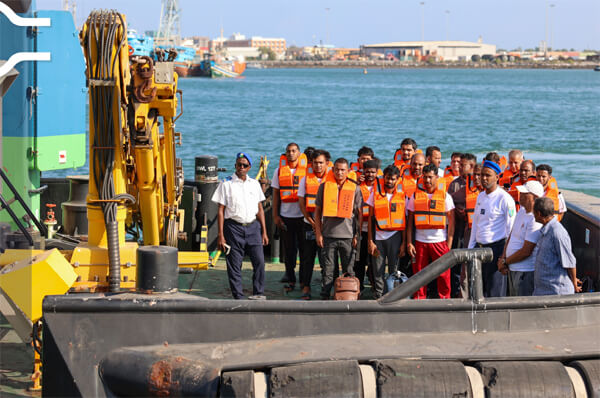
Crew arrived in Djibouti after being rescued by a French frigate (Djibouti Ports & Free Zones Authority)
The authorities in Djibouti said the vessel had been attacked and experienced severe engine room flooding. None of the Western authorities however cited an attack with most reports saying the vessel experienced an engine problem or possibly an internal explosion. The Houthis’ spokesperson has not acknowledged the incident or claimed responsibility.
United Kingdom Maritime Trade Operations released a warning alert on Friday after a “military source” reported the drifting vessel approximately 105 nautical miles northwest of Hudaydah, Yemen. “A merchant vessel is listing astern and is a hazard to shipping,” UKMTO warned saying the vessel was drifting and not under command.
Aspides highlights the strong coordination between the forces to rescue the crew without incident.
Historic Research Vessel Sinks Before Scheduled Reefing
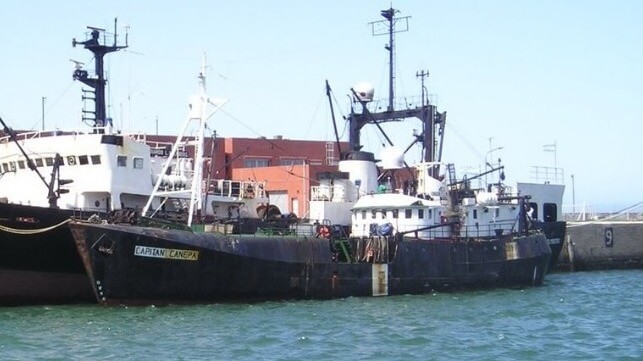
A historic research vessel that was scheduled to be reefed off Mar del Plata has gone down a few days early, and in the wrong location.
The 1964-built Capitan Canepa was a fishing vessel that was purchased by Argentina's national fisheries institute (INIDEP) in 1979 and used for research. She had a long career totaling 40 years and more than 200 scientific voyages, and she participated in SAR duties on the Argentine side during the Falklands conflict in 1982. According to local industry outlet Pescare, the Canepa was remembered well by former crewmembers for her sea-kindliness, and she was home to generations of Argentine oceanographic researchers.
However, time takes its toll on every vessel. A union labor conflict led to deferred maintenance, accelerating her deterioration in her final years. The Canepa was decommissioned in 2019, and was selected for decontamination and intentional sinking as a manmade reef at Argentina's Cristo Rey underwater park.
On Wednesday morning, days before the tow to her final destination, the vessel unexpectedly sank alongside the pier at the Mar del Plata Naval Base. No personnel were injured, and as the vessel had been stripped for reefing there was no environmental harm, though onsite pollution control measures were still followed as a precaution after the sinking. The cause of the casualty is believed to be leakage from the vessel's structural deterioration.
"Its sinking, although laden with sadness, could be seen as a poetic echo of its history: a giant that, exhausted by the vicissitudes of time, finally found rest, avoiding the cutting of its scrapyard and sheltered by the waters that saw it set off on more than 200 oceanographic and fisheries research campaigns," wrote Pescare.
Autonomy-Equipped Barge Collides With Vessel Near Rotterdam
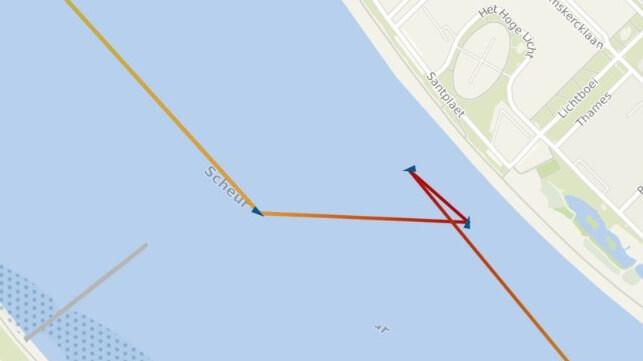
On Thursday, Dutch media reported that a container ship collided with an inland vessel on the river Scheur near Rotterdam, spilling at least four containers into the water. One of the vessels was an autonomous barge, one of the first vessels of its kind in the world - though the barge was under control of a human captain on the bridge at the time of the casualty, according to the operator.
At about 0615 hours Thursday, two vessels collided near Koning Willem-Alexander Boulevard in Maassluis, in the river channel that leads to Rotterdam's inner harbor. Both vessels remained afloat, but multiple shipping containers went over the side. At least four containers - all empties - washed up on the bank of the river on the Maassluis side, according to local outlet Rijnmond. The maintenance and salvage vessel Hebo Cat 7 was dispatched to recover the cranes from the riverbank.
Maritime media outlets have identified one of the vessels as the River Drone 5, one of 10 newly-delivered autonomous dry cargo barges operated by a Dutch firm. AIS data (top) shows that it performed a round turn. The contracted autonomous vessel operator confirms that the barge was in a collision, but says that it was not in autonomous mode.
"The vessel was under the command of a captain onboard, and so cannot be classified as an autonomous vessel during the incident," a spokesman for operator Seafar said in a comment.
The River Drone fleet is one of the largest-scale experiments in commercial remote-controlled operation in Europe. This fleet is designed and equipped for automated, remote-controlled operation using Seafar remote navigation technology. Each vessel is about 100 meters long and has a deadweight capacity of 3,850 tonnes, and the first hull entered into service in January 2023.
The Netherlands recently amended its inland navigation laws to make it easier for tech companies to test out autonomous systems for shipping. Starting January 1, it will be legal to operate commercial vessels on Dutch inland canal systems without any crew on board. Up until that date, all operations - autonomous or not - have a legal manning requirement in all Dutch waters.
No comments:
Post a Comment